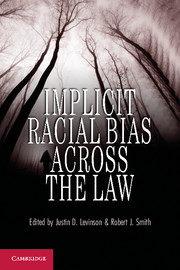Book contents
- Frontmatter
- Contents
- Contributors
- Acknowledgments
- Implicit Racial Bias Across the Law
- Introduction Racial Disparities, Social Science, and the Legal System
- 1 Implicit Racial Bias
- 2 Property Law
- 3 Criminal Law
- 4 Torts
- 5 Employment Law
- 6 Health Law
- 7 Education Law
- 8 Communications Law
- 9 Corporations Law
- 10 Tax Law
- 11 Intellectual Property
- 12 Environmental Law
- 13 Federal Indian Law
- 14 Capital Punishment
- 15 Reparations Law
- Index
- References
5 - Employment Law
Implicit Bias in Employment Litigation
Published online by Cambridge University Press: 05 June 2012
- Frontmatter
- Contents
- Contributors
- Acknowledgments
- Implicit Racial Bias Across the Law
- Introduction Racial Disparities, Social Science, and the Legal System
- 1 Implicit Racial Bias
- 2 Property Law
- 3 Criminal Law
- 4 Torts
- 5 Employment Law
- 6 Health Law
- 7 Education Law
- 8 Communications Law
- 9 Corporations Law
- 10 Tax Law
- 11 Intellectual Property
- 12 Environmental Law
- 13 Federal Indian Law
- 14 Capital Punishment
- 15 Reparations Law
- Index
- References
Summary
Every employment discrimination lawsuit tells at least two stories – stories that are about judgment, discretion, and even bias. One story starts long before litigation, with workplace relationships and decisions. The parties end up in court only after one of the actors, the defendant, decided that the other, the plaintiff, will be fired or not hired, demoted, or not given a raise. Those decisions invariably involve personal judgments – even biases that are explicit or implicit. Once an adverse employment action is challenged in court, however, a new story, with yet another set of decision-makers takes over. Even then, the decisions that judges must make about how to interpret the information presented in court leave room for discretion, judgment, and a new opportunity for bias.
Judges rarely recognize the part they play in this second story line. A few years ago at an annual event held in Massachusetts, a plaintiff's attorney asked a panel of district court judges, “Why are federal judges so hostile to employment discrimination claims?” Most of the judges protested that they were not personally biased against these claims; they were merely applying the law. However, U.S. District Judge Nancy Gertner (one of the authors) agreed with the lawyer, rather than her colleagues, holding that both the law and often those applying it reflect a deep skepticism about claims of discrimination that necessarily affects litigation outcomes.
- Type
- Chapter
- Information
- Implicit Racial Bias across the Law , pp. 80 - 94Publisher: Cambridge University PressPrint publication year: 2012
References
- 4
- Cited by

